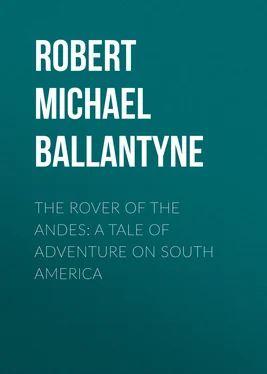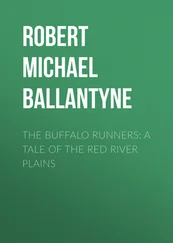Robert Michael Ballantyne - The Rover of the Andes - A Tale of Adventure on South America
Здесь есть возможность читать онлайн «Robert Michael Ballantyne - The Rover of the Andes - A Tale of Adventure on South America» — ознакомительный отрывок электронной книги совершенно бесплатно, а после прочтения отрывка купить полную версию. В некоторых случаях можно слушать аудио, скачать через торрент в формате fb2 и присутствует краткое содержание. Жанр: Детские приключения, literature_19, foreign_antique, foreign_prose, foreign_children, на английском языке. Описание произведения, (предисловие) а так же отзывы посетителей доступны на портале библиотеки ЛибКат.
- Название:The Rover of the Andes: A Tale of Adventure on South America
- Автор:
- Жанр:
- Год:неизвестен
- ISBN:нет данных
- Рейтинг книги:5 / 5. Голосов: 1
-
Избранное:Добавить в избранное
- Отзывы:
-
Ваша оценка:
- 100
- 1
- 2
- 3
- 4
- 5
The Rover of the Andes: A Tale of Adventure on South America: краткое содержание, описание и аннотация
Предлагаем к чтению аннотацию, описание, краткое содержание или предисловие (зависит от того, что написал сам автор книги «The Rover of the Andes: A Tale of Adventure on South America»). Если вы не нашли необходимую информацию о книге — напишите в комментариях, мы постараемся отыскать её.
The Rover of the Andes: A Tale of Adventure on South America — читать онлайн ознакомительный отрывок
Ниже представлен текст книги, разбитый по страницам. Система сохранения места последней прочитанной страницы, позволяет с удобством читать онлайн бесплатно книгу «The Rover of the Andes: A Tale of Adventure on South America», без необходимости каждый раз заново искать на чём Вы остановились. Поставьте закладку, и сможете в любой момент перейти на страницу, на которой закончили чтение.
Интервал:
Закладка:
R. M. Ballantyne
The Rover of the Andes: A Tale of Adventure on South America
Chapter One.
A Tale of Adventure in South America. At the Foot of the Mountain Range
Towards the close of a bright and warm day, between fifty and sixty years ago, a solitary man might have been seen, mounted on a mule, wending his way slowly up the western slopes of the Andes.
Although decidedly inelegant and unhandsome, this specimen of the human family was by no means uninteresting. He was so large, and his legs were so long, that the contrast between him and the little mule which he bestrode was ridiculous. He was what is sometimes styled “loosely put together;” nevertheless, the various parts of him were so massive and muscular that, however loosely he might have been built up, most men would have found it rather difficult to take him down. Although wanting in grace, he was by no means repulsive, for his face, which was ornamented with a soft flaxen beard and moustache of juvenile texture, expressed wonderful depths of the milk of human kindness.
He wore boots with the trousers tucked into them, a grey tunic, or hunting coat, belted at the waist, and a broad-brimmed straw hat, or sombrero.
Evidently the times in which he travelled were troublous, for, besides having a brace of large pistols in his belt, he wore a cavalry sabre at his side. As if to increase the eccentricity of his appearance, he carried a heavy cudgel, by way of riding-whip; but it might have been observed that, however much he flourished this whip about, he never actually applied it to his steed.
On reaching a turn of the road at the brow of an eminence the mule stopped, and, letting its head droop till almost as pendent as its tail, silently expressed a desire for repose. The cavalier stepped off. It would convey a false impression to say that he dismounted. The mule heaved a sigh.
“Poor little thing!” murmured the traveller in a soft, low voice, and in a language which even a mule might have recognised as English; “you may well sigh. I really feel ashamed of myself for asking you to carry such a mass of flesh and bone. But it’s your own fault—you know it is—for you won’t be led. I’m quite willing to walk if you will only follow. Come—let us try!”
Gently, insinuatingly, persuasively, the traveller touched the reins, and sought to lead the way. He might as well have tried to lead one of the snow-clad peaks of the mighty Cordillera which towered into the sky before him. With ears inclining to the neck, a resolute expression in the eyes, his fore-legs thrown forward and a lean slightly backward, the mule refused to move.
“Come now, do be amiable; there’s a good little thing! Come on,” said the strong youth, applying more force.
Peruvian mules are not open to flattery. The advance of the fore-legs became more decided, the lean backward more pronounced, the ears went flat down, and incipient passion gleamed in the eyes.
“Well, well, have it your own way,” exclaimed the youth, with a laugh, “but don’t blame me for riding you so much.”
He once more re-m–; no, we forgot—he once more lifted his right leg over the saddle and sat down. Fired, no doubt, with the glow of conscious victory the mule moved on and up at a more lively pace than before.
Thus the pair advanced until they gained a rocky eminence, whence the rich Peruvian plains could be seen stretching far-away toward the glowing horizon, where the sun was about to dip into the Pacific.
Here again the mule stopped, and the rider getting off sat down on a rock to take a look at the level horizon of the west—for he had reached a spot where the next turn in the road would partially shut out the plains and enclose him among the giant mountains.
As he sat there meditating, while the mule cropped the herbage at his side, he observed two riders a considerable way down the circuitous road by which he had ascended—a man and a boy, apparently.
Whether it was the fine stalwart figure of the man that influenced him, or the mere presence of wayfarers in such a solitary place, our traveller could not tell, but he certainly felt unusual interest, and not only watched the pair as they approached, but sat still until they came up. As they drew near he perceived that the smaller of the two, whom at a distance he had taken for a boy, was an Indian girl, who, according to custom, bestrode her mule like a man. Her companion was a handsome Spanish-looking man—a Peruvian or it might be a Chilian—with fine masculine features and magnificent black eyes. He was well-armed, and, to judge from his looks, seemed a little suspicious of the tall Englishman.
The hearty salutation of the latter, however, in bad Spanish, at once dissipated his suspicions. Replying in the same tongue, he then added, in good English:—
“You are a stranger in this land, I perceive.”
“In truth I am,” replied the other, while the Peruvian dismounted, “nevertheless, I ought scarcely to admit the fact, for I was born in Peru. This perhaps may seem contradictory, but it is not more so than your being apparently a native of the soil yet speaking English like an Englishman.”
“From which it follows,” returned the Peruvian, “that men ought not to judge altogether by appearances. But you are wrong in supposing me a native of the soil, and yet—I am not an Englishman. I have got a gift of language, however—at least I feel myself equally at home in English, Indian, Spanish, and Portuguese, which is not to be wondered at, seeing that I have been forced to talk in all four languages for nigh a quarter of a century.”
“Then you must have been but a boy when you came here,” returned the Englishman, “for you seem to be not yet middle-aged.”
“Right, I was indeed a mere boy when I came to this land.”
“And I was a boy of seven when I left it to be educated in Europe,” returned the Englishman. “It is sixteen years since then, and I had feared that my memory might have failed to recognise the old landmarks, but I am rejoiced to find that I remember every turn of the road as if I had left home but yesterday.”
We have said that the tall youth’s face was not handsome, but the glow of animation which rested on it when he spoke of home, seemed for a moment to transform it.
“Your home, then, cannot be far distant?” remarked the Peruvian, with a peculiar look that might have attracted the attention of the younger man if his gaze had not at the moment been directed to the Indian girl, who, during the foregoing conversation, had remained motionless on her mule with her eyes looking pensively at the ground, like a beautiful statue in bronze.
“My home is close at hand,” said the Englishman, when the question had been repeated; “unless memory plays me false, two more turns in the road will reveal it.”
The earnest look of the Peruvian deepened as he asked if the Estate of Passamanka was his home.
“Yes, you know it, then?” exclaimed the youth eagerly; “and perhaps you knew my father too?”
“Yes, indeed; there are few people within a hundred miles of the place who did not know the famous sugar-mill and its hospitable owner, Senhor Armstrong. But excuse me,” added the Peruvian, with some hesitation, “you are aware, I suppose, that your father is dead?”
“Ay, well do I know that,” returned the other in a deeper tone. “It is to take my father’s place at the mills that I have been hastily summoned from England. Alas! I know nothing of the work, and it will be sorely against the grain to attempt the carrying on of the old business in the desolate old home.”
“Of course you also know,” continued the Peruvian, “that the country is disturbed just now—that the old smouldering enmity between Chili and Peru has broken forth again in open war.”
Читать дальшеИнтервал:
Закладка:
Похожие книги на «The Rover of the Andes: A Tale of Adventure on South America»
Представляем Вашему вниманию похожие книги на «The Rover of the Andes: A Tale of Adventure on South America» списком для выбора. Мы отобрали схожую по названию и смыслу литературу в надежде предоставить читателям больше вариантов отыскать новые, интересные, ещё непрочитанные произведения.
Обсуждение, отзывы о книге «The Rover of the Andes: A Tale of Adventure on South America» и просто собственные мнения читателей. Оставьте ваши комментарии, напишите, что Вы думаете о произведении, его смысле или главных героях. Укажите что конкретно понравилось, а что нет, и почему Вы так считаете.












